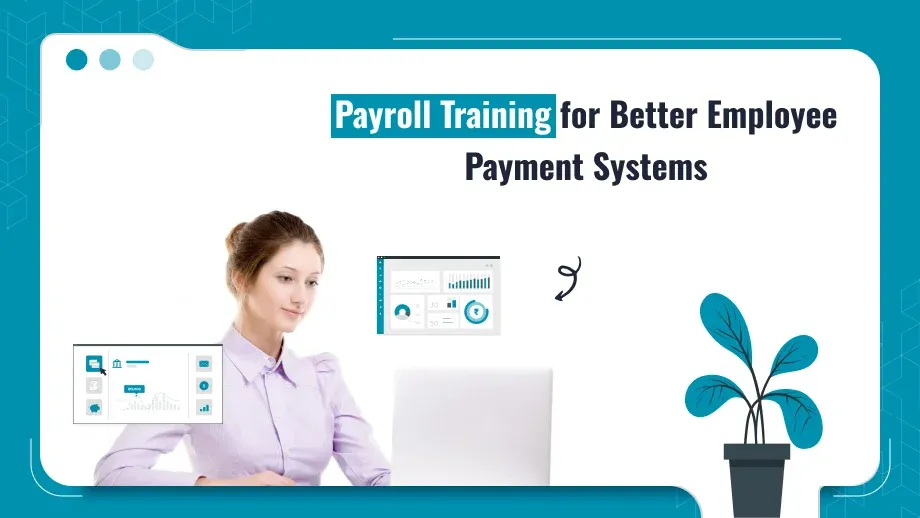
Any company that pays its staff relies heavily on payroll. It involves keeping financial records and compensating workers for the labor they do in a methodical manner while adhering to local and federal regulations.Payroll training ensures that companies can do this job error-free and flawlessly, ensuring that workers receive their paychecks on schedule and in the correct amount.
Payroll training and payroll templates is probably the most underappreciated activity when running a small business, yet it is one of the most critical tasks to accomplish efficiently. For payroll training programs, employees and business owners must be taught to accurately compute salaries, deduct taxes, and manage benefits for legal and regulatory compliance.
In today’s digital age, people have evolved with advanced automated payroll systems; therefore, knowledge of payroll processing is substantially more important. Proper payroll training can help businesses avoid costly mistakes and compliance with taxes and employee satisfaction.
Types of payroll training
Training payroll is an essential function for any organization to offer regarding the HR and financial part. Since HR payroll training involves quite complex processes, ranging from the legal to financial or the software-related activities that make it up, any errors might be costly; thus, these professionals need specific training about all payroll practices, which will keep payroll functions compliant and error-free. Below is a detailed type of training for professionals with payroll software systems.
In-Person Payroll Training for HR
The benefit of in-person training is the opportunity to connect with teachers and other students in person. HR workers can learn about payroll systems, tax rules, deductions, and other related issues in these courses, which are usually held in workshops or classroom settings.
Benefits
Practical learning: Students can practice in real time, ask questions, and communicate directly with teachers.
Networking: HR specialists from different sectors can connect with one another and exchange experiences.
Expert-led instruction: Access to industry professionals who can offer insights, respond to inquiries, and present real-world examples is made possible through in-person training.
HR Payroll Training Online
Training for online payroll will be flexible and convenient. It enables HR professionals to study whenever it is most convenient for them. The majority of online platforms offer thorough payroll theory, training, and payroll software usage. Online training might take the form of discussion boards, video lessons, tests, and downloaded materials.
Benefits
Flexibility: HR professionals can improve their work-life balance by learning at their own speed.
Resource Access: Students get constant and unrestricted access to lectures, videos, and course materials.
economical: Generally speaking, online courses are less costly than traditional classroom training.
Payroll software-specific training for HR
The most crucial tool HR professionals utilize to expedite the payroll process is payroll software. Making an HR team skilled in one or more payroll systems- – QuickBooks, Paychex, ADP, or Gusto—is the main goal of payroll software training.
Benefits
Expertise: Payroll software training is designed to help HR professionals operate payroll systems correctly.
Software Updates: Payroll software is being constantly updated. Training in payroll provides the HR teams with up-to-date new features, tax rules, and compliance tools.
Time Saving: With effective training, payroll can be outsourced and saved through automation.
Certification Payroll Training for Human Resources
For HR professionals who want to formalize their payroll expertise, certification programs provide structured training on all aspects of payroll management. Certification programs tend to be more comprehensive and more recognized in the industry, providing credibility to an HR professional’s expertise in payroll.
Benefits:
Industry Recognition: Certification builds recognition with employers by way of credentials.
Comprehensive training :encompasses all types of payroll processing, including taxes, compliance, software usage, and reporting.
Career Advancement: The job opportunities and salaries will increase for certified payroll professionals.
Boost your payroll skills with payroll training today!
Enroll now and streamline your payroll process with confidence.
Design Payroll Training for Human Resource Departments
Customized according to the needs of an organization’s HR performance management department. The training will be customized to meet the needs of the payroll systems, policies, and the challenges an organization faces. It can be delivered either in-person or online, depending on the company’s preference.
Benefits:
Tailored content: addresses the distinctive needs and challenges of the organization such as any payroll-specific software requirements, tax jurisdiction, or benefit management.
Team Focused: Rather than training individual HR professionals, customized training can be provided to a whole payroll or HR team to ensure that all of them are aligned.
Improved Efficiency: With an emphasis on company-specific issues, customized training enables HR teams to resolve their unique payroll challenges much faster.
Payroll Training for Global HR Professionals
In the global workplace, many companies require payroll employees to process payroll for cross-border countries. Global HR professionals require training on international payroll systems, multi-country tax laws, and compliance with local regulations in various regions.
Benefits:
Global Competence: Payroll training courses for professionals gain expertise to handle payroll in multiple countries with diverse tax and compliance regulations.
Efficient Global Management: By understanding global payroll systems, HR professionals can streamline international payroll processes and avoid many pitfalls.
Payroll Training for HR Professionals
Payroll training for HR professionals and HR skills is truly the way to ensure efficient and compliant payroll processing. From in-person training and online courses to specialized certifications and software training, there are many types of training available to HR professionals. All of these have different advantages and advantages, such as flexibility, expertise in specific software, and in-depth knowledge of compliance and tax regulations. By choosing the right training program, HR professionals can enhance their skills in payroll management, keep themselves updated on the latest regulatory changes, and thus ultimately help the organization to which they are attached.
Payroll Administration and Organization
1. Payroll Administration and Organization
Managing every aspect of employee compensation, including salary and benefit deductions, and guaranteeing that all payments are made on time and without errors is known as payroll management. In order to promote faster payroll processes, increase accuracy, and decrease errors, this topic discusses the necessity of a structured payroll system and how processes should be set out.
A good payroll system also ensures that the payroll data is tracked accordingly, files are organized, and all employees receive their pay on time. Training under this section will also include payroll audits, verification of employees’ working hours, and establishing precise payroll timelines.
2. Implementation of Payroll Software Systems
In recent years, with most businesses being digitized, the implementation of payroll software has become a prime skill for any HR professional. This training topic would cover the step-by-step process of selecting and implementing payroll software tailored to a company’s needs. It would include system setup, importing employee data, configuring pay rates, deductions, and ensuring the system complies with tax laws.
Payroll software can automate complex processes like tax calculation, benefits deductions, and even integrate with time and attendance systems. Proper training ensures employees will utilize the maximum features of the software while keeping the risks of manual errors low.
3. International Payroll and Global Compliance
International payroll for global companies is a huge headache as it deals with several countries. This subject has been designed for those working in HR, taking responsibility for payroll management across their global operations.
It encompasses the subtleties of processing employee payroll across different jurisdictions, currency conversion, and even compliance with local tax laws as well as international labor regulations. The training identifies some of the challenges such as cross-border taxation, social security agreements, and even local employment standards, arming participants with the expertise needed to manage payroll on a global scale.
4. Payroll Taxation for Different Employment Types
Understanding the tax implications of various employment agreements is essential since payroll tax varies based on the type of employment. This course covers the application of tax laws to several sorts of workers, including independent contractors, freelancers, full-time employees, and part-time employees.
It entails being aware of tax rates, withholding rules, and the responsibilities of both the company and the employee according to various employment contracts. Another great aspect of the course covers such basic topics as when to submit tax forms – W-2, 1099; tax exemptions, among other federal and state complexities involved with taxes.
5. Payroll and Employee Benefit Administration
Payroll isn’t just about salary – it includes the administration of many other employee benefits like medical and retirement plans, too; or “vacation leave or sick leave,” popularly called PTO. This section covers how benefits are processed within payroll systems, including proper deductions for insurance premiums, retirement plan contributions, and flexible spending accounts.
The workday payroll training provides insight into compliance with laws such as the Affordable Care Act (ACA) and how to handle employee benefit changes, open enrollment periods, and benefits reporting. Understanding how to properly introduce benefits into payroll ensures that employees are justly compensated and receive every benefit they are entitled to.
6. Payroll Reporting and Financial Compliance
Payroll reporting is highly important for both internal and external compliance. This module deals with how payroll experts should prepare and submit reports including Form 941, Form W-2, and other IRS-mandated reports.
It deals with financial compliance through payroll, including quarterly and annual tax reports, garnishments of wages, and reports on employee benefits. It underlines the importance of an accurate payroll record for auditing. Training in payroll reporting provides companies with a guarantee not to make costly mistakes that will attract penalties and put them out of compliance in all the relevant laws, particularly tax laws and labor regulations.
7. Compliance with Labor Laws and Payroll
Employees in payroll must be educated on and stay up to date on changes to state and federal labor laws. Fundamentals of labor law compliance, such as minimum wage, compensation for overtime, employee categorization (exempt vs. non-exempt), and benefits at work, are covered in the training.
Wage garnishment, child labor regulations, and compensation for employees are further subjects. Payroll systems following regulatory regulations can reduce expensive fines and litigation. Payroll managers would stay informed about legislation changes and use the appropriate strategy to comply with them thanks to this subject.
8. Payroll Fraud Prevention and Security
Fraud in payroll is an area of concern for an organization, and proper training in payroll can help curb such risks. This subject area addresses the different payroll types and fraud (ghost employees, falsified work hours, and employee misclassification) and what the HR professional and the payroll manager can do to prevent this in the organization.
This includes training in establishing internal controls, verification of employee data, and periodic audits of payroll reports. Finally, the use of secure payroll software should be part of the learning experience. Understanding payroll security measures, such as encryption and restricted access to sensitive payroll information, is critical to preventing unauthorized access and fraud.
9. Payroll for Non-Profit Organizations
Managing payroll in a non-profit organization poses specific challenges. This topic covers special considerations in non-profit payroll management, such as tax-exempt status, volunteer compensation management, and employee classification rules compliance.
Payroll training for non-profits will also explain how government grants and donor-funded wages are managed in an organization in a transparent and accountable manner through payroll practices.
10. Payroll Training for Remote and Hybrid Workers
Remote and hybrid work models have brought new payroll management issues. This section deals with the intricacies of running payroll for remote and hybrid employees working from different places, states, or even countries. It will cover managing remote employees’ pay rates, overtime, and tax deduction, all while staying compliant with labor laws across several jurisdictions.
The training is set around time-tracking for the remote employees, the irregular nature of work hours that employees put in, and how one is compensated through remunerations and expenditures regarding the business and, indeed, ensuring workers’ payment. This is basically core training.
11. Payroll and Labor Law Compliance
The payroll staff should be educated about and updated on state and federal labor laws changes. The training topic should encompass the basics of labor law compliance on minimum wage, overtime pay, employee classification exempt vs. non-exempt, and workplace benefits.
Other topics include wage garnishment, child labor laws, and workers’ compensation. The alignment of the payroll system with the legal requirements can be minimized in costly penalties and lawsuits. This subject would update payroll managers with legislative changes and apply the right approach in being compliant with them.
12. Payroll for Temporary or Seasonal Employees
The payroll issues that the temporary or seasonal employee brings are unique and call for training on how one would process payroll for this set of employees, including their rates of pay, eligibility to other benefits, and the tax implications of short-term employment.
The training will then address how to handle payments of workers whose schedules may be irregular, while the classification of employees must also be addressed to ensure that one is in compliance with the labor laws regarding temporary employment.Organizations, which utilize seasonal workers, or contract staff to satisfy seasonal demand, must stay abreast of the temporary employment laws.
13. Payroll Processing for Employees on Leave of Absence
Payroll processing for employees on leave of absence is relatively complex and requires special handling. This training topic is on the procedures involved in managing payroll when the employees are on different kinds of leave, such as maternity leave, medical leave, or vacation leave.
Training includes the payroll calculations of paid versus unpaid leave, understanding FMLA regulations, and managing benefits during an employee’s absence. Payroll professionals are trained to maintain accurate leave records and ensure that employees’ pay is adjusted correctly based on the type of leave they are taking.
14. Payroll System Troubleshooting and Issue Resolution
Best efforts notwithstanding, payroll problems can still pop up, such as incorrect payments, wrong tax deductions, or even computer errors. This topic would be designed to assist the payroll professional to troubleshoot common payroll problems and solve them with less hassle.
The training on the recognition of payroll processing errors, correction, investigating discrepancies, and preventing them from repeating themselves would be appropriate. With proper knowledge of payroll troubleshooting, payroll managers will address issues right away, and therefore payroll operations will be minimal without disruption, and employees will be satisfied.
Conclusion
In order to ensure that employees are paid promptly and fairly, training is a crucial component of managing a firm. From figuring out compensation to understanding tax laws, businesses of all sizes should be familiar with the fundamentals of payroll. Training programs on payroll prepare professionals with the appropriate skills to handle payroll correctly and make expensive mistakes. Training programs enroll one to ensure that their compliance with tax laws is maintained and error risks reduced, in addition to ensuring employees’ satisfaction. An HR professional, business owner, or aspiring payroll specialist all need to be trained on payroll since mastery of this fundamental function of the modern workforce is worth a lot.









